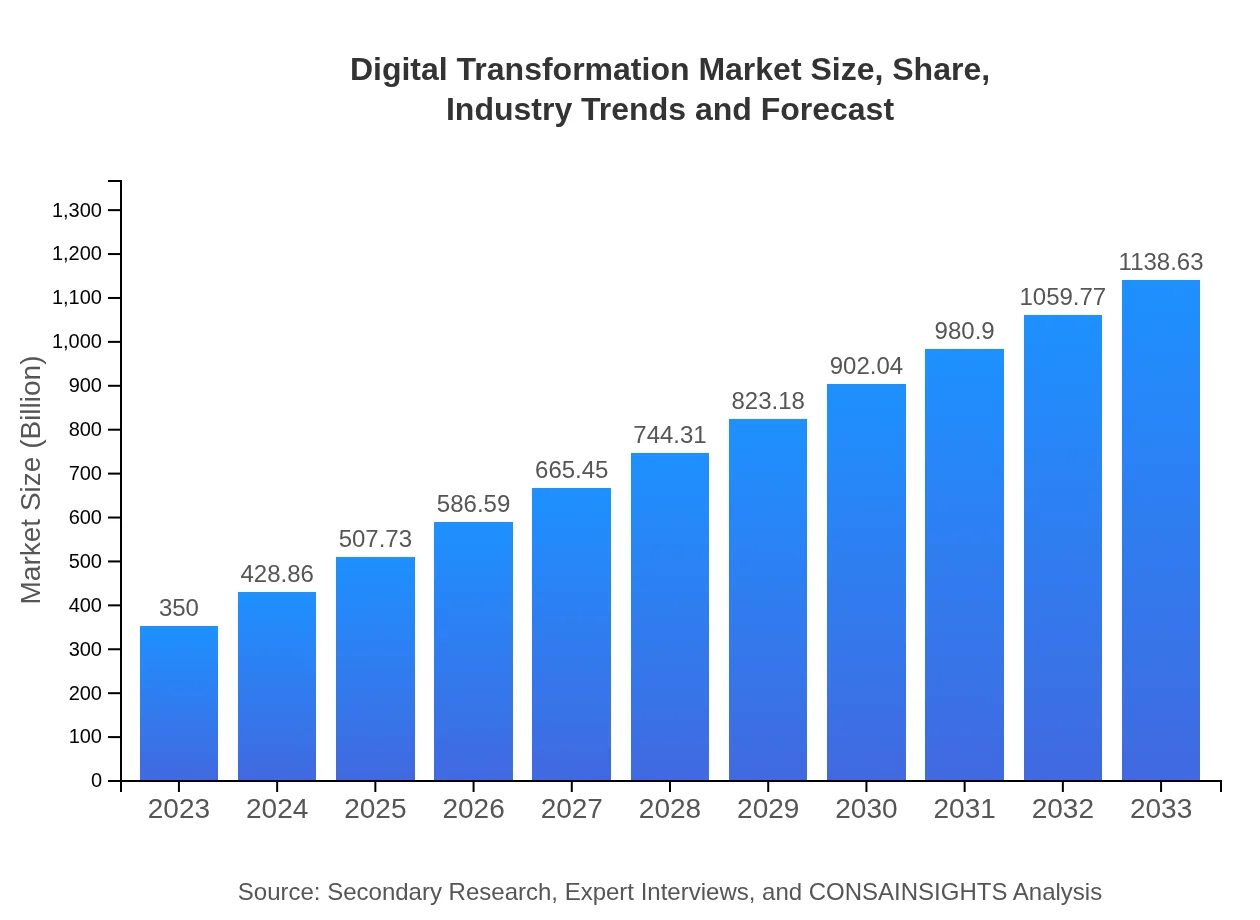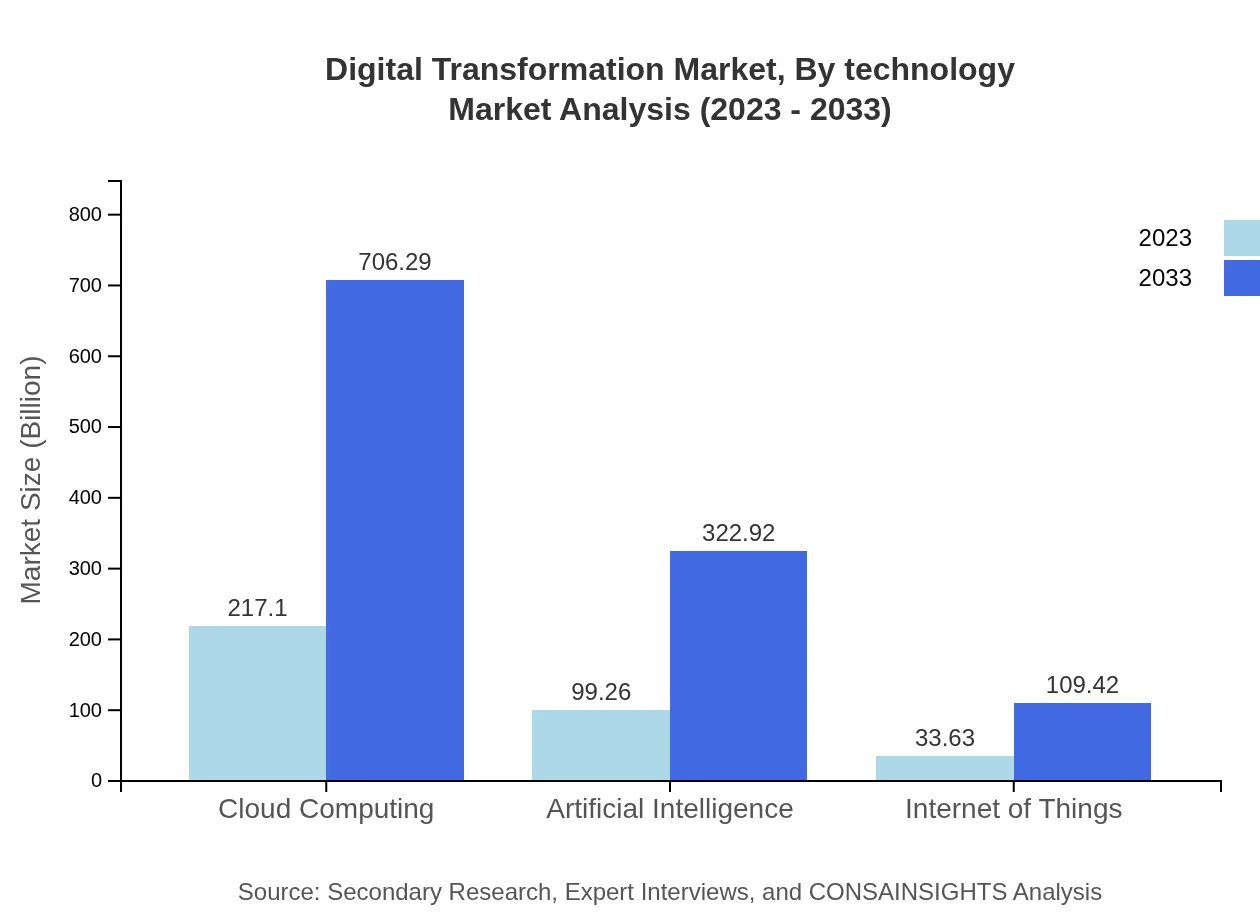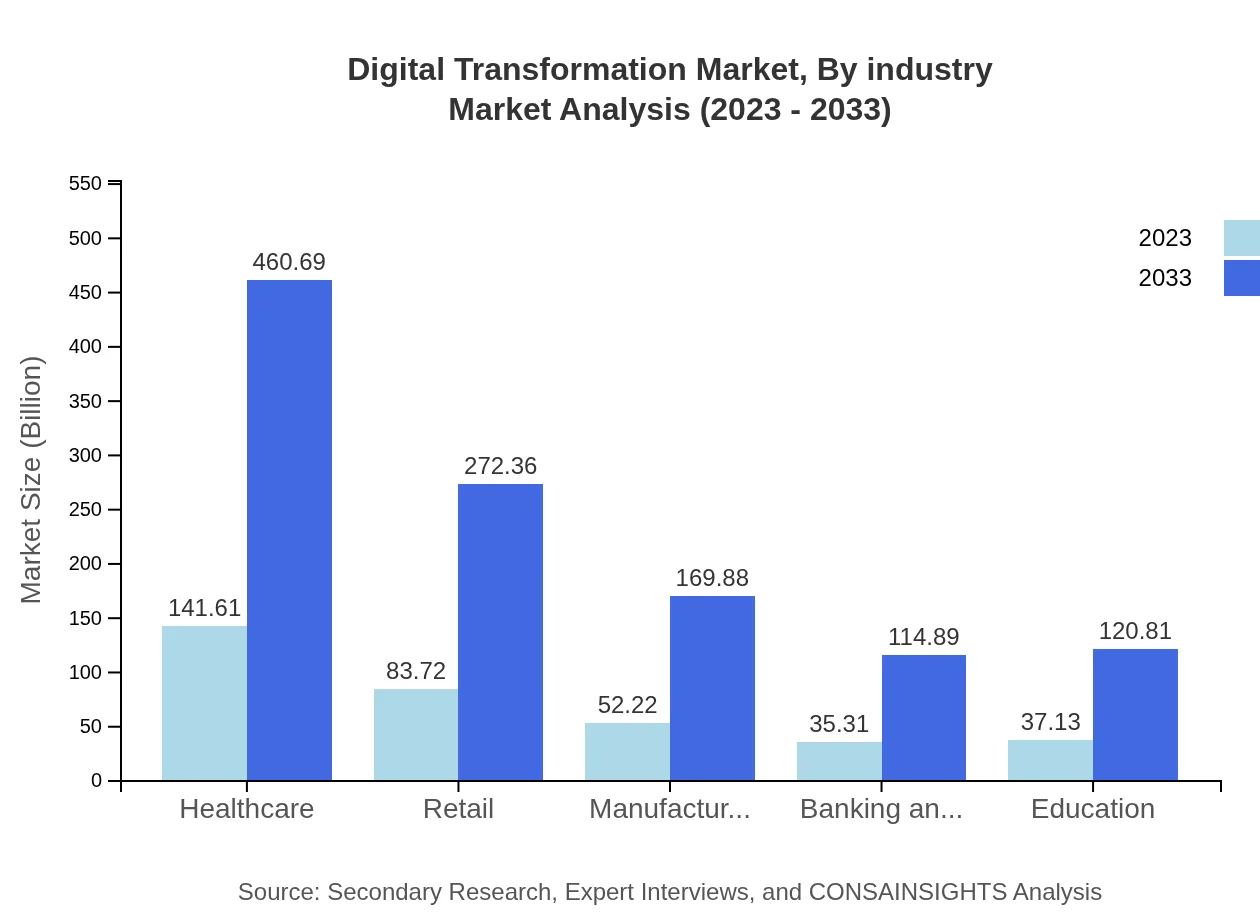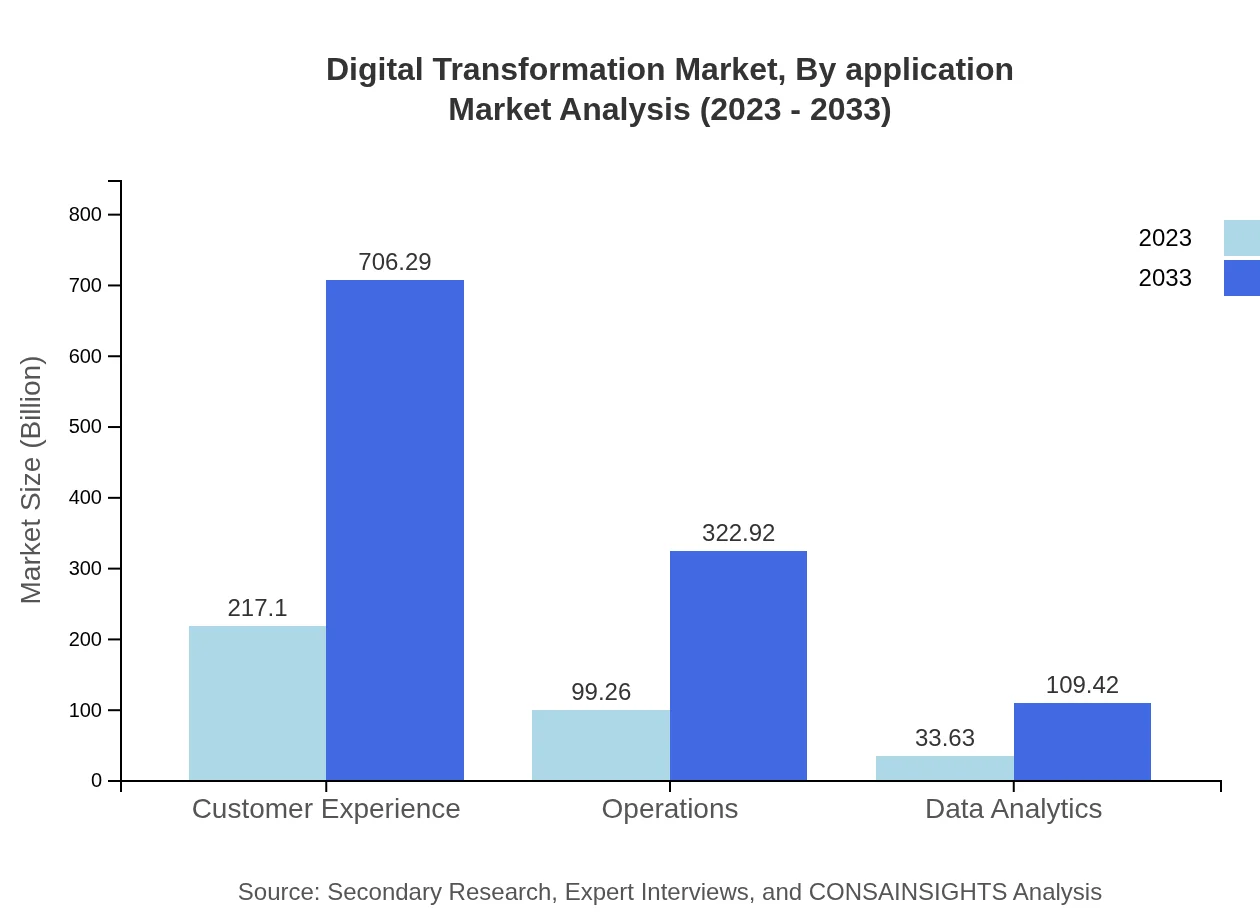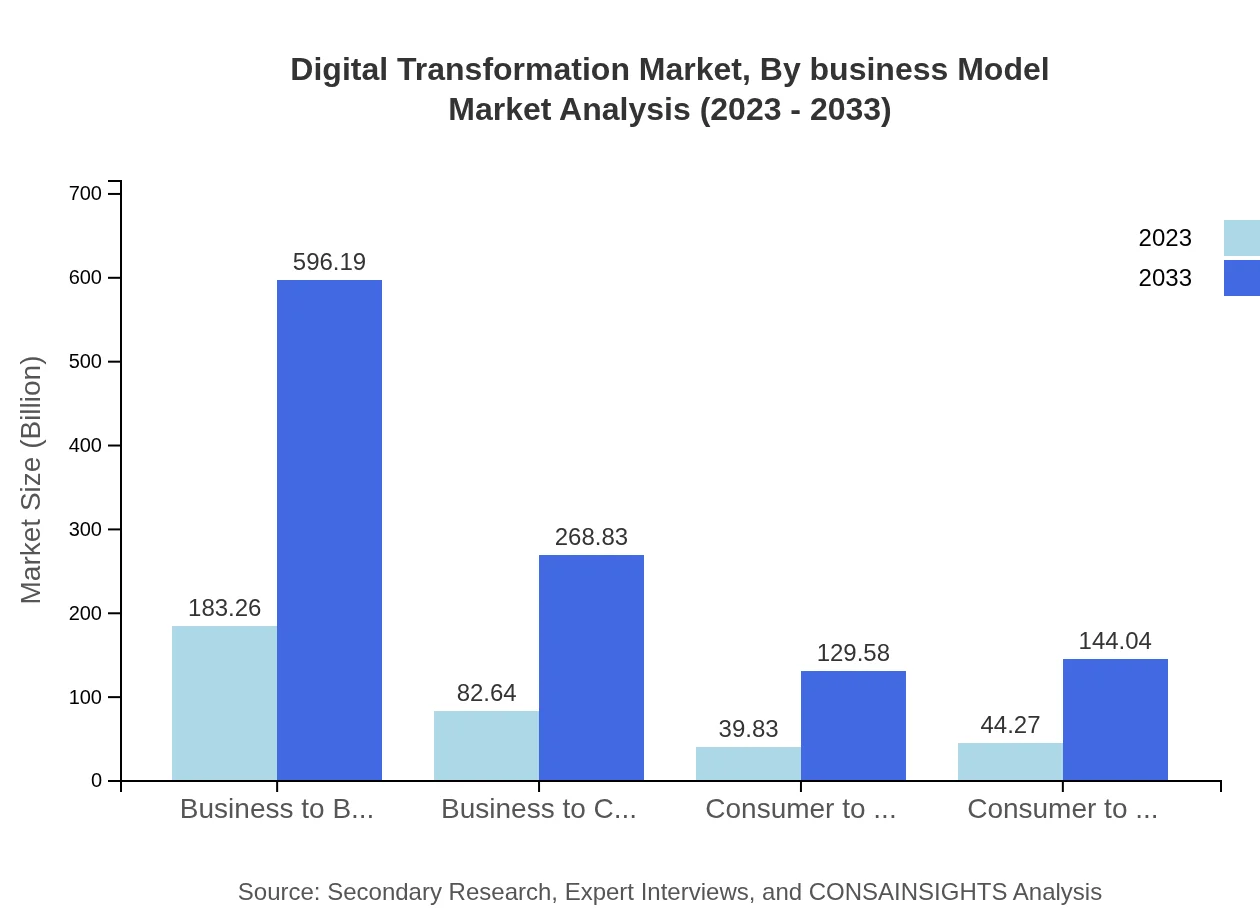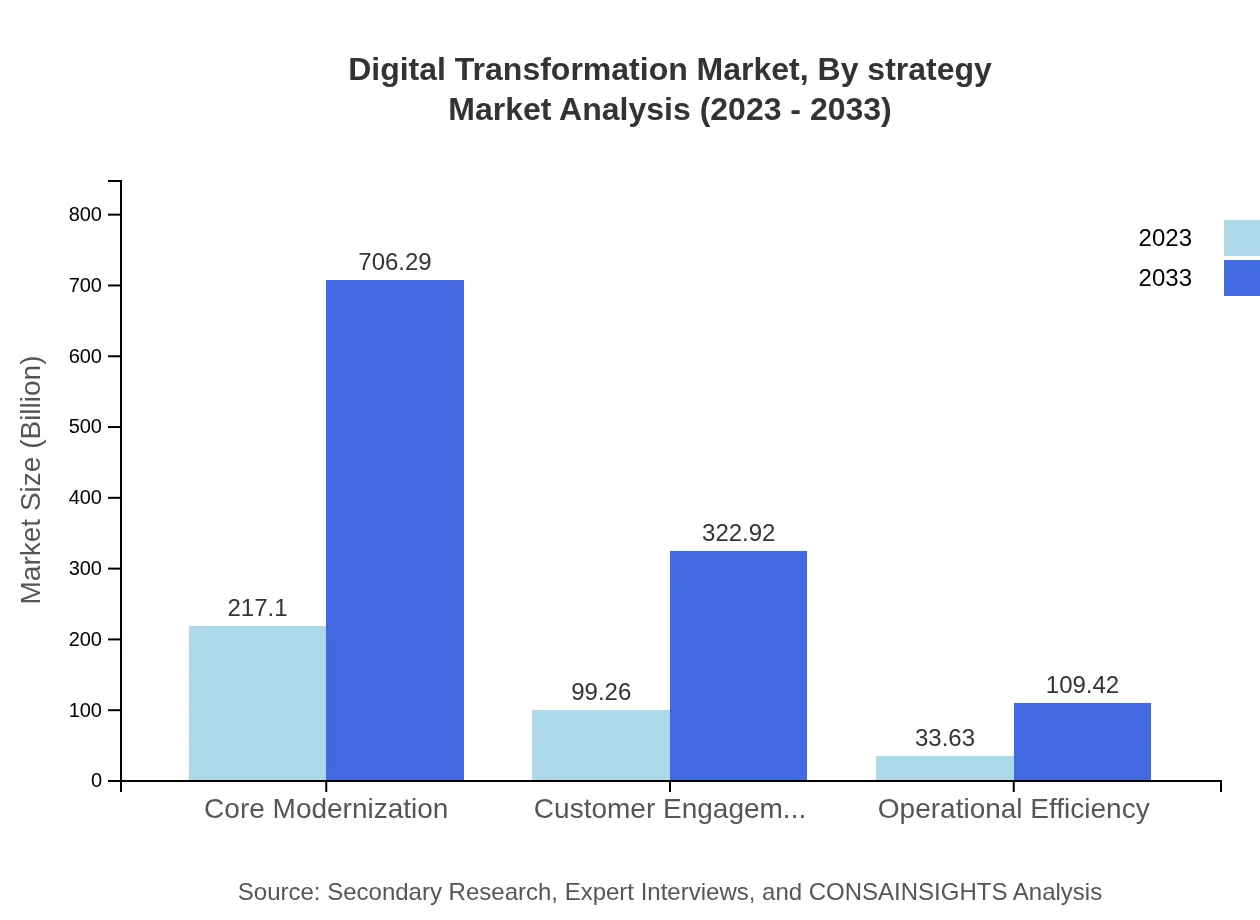Digital Transformation Market Report
Published Date: 31 January 2026 | Report Code: digital-transformation
Digital Transformation Market Size, Share, Industry Trends and Forecast to 2033
This report provides a comprehensive analysis of the Digital Transformation market from 2023 to 2033. It includes insights on market size, growth trends, regional dynamics, key technologies, and the competitive landscape.
| Metric | Value |
|---|---|
| Study Period | 2023 - 2033 |
| 2023 Market Size | $350.00 Billion |
| CAGR (2023-2033) | 12% |
| 2033 Market Size | $1138.63 Billion |
| Top Companies | Microsoft Corporation, IBM Corporation, SAP SE, Salesforce, Oracle Corporation |
| Last Modified Date | 31 January 2026 |
Digital Transformation Market Overview
Customize Digital Transformation Market Report market research report
- ✔ Get in-depth analysis of Digital Transformation market size, growth, and forecasts.
- ✔ Understand Digital Transformation's regional dynamics and industry-specific trends.
- ✔ Identify potential applications, end-user demand, and growth segments in Digital Transformation
What is the Market Size & CAGR of Digital Transformation market in 2023?
Digital Transformation Industry Analysis
Digital Transformation Market Segmentation and Scope
Tell us your focus area and get a customized research report.
Digital Transformation Market Analysis Report by Region
Europe Digital Transformation Market Report:
The European digital transformation market is projected to grow from $84.18 billion in 2023 to $273.84 billion by 2033. Extensive regulatory support and the need for increased productivity and efficiency across industries contribute to this growth.Asia Pacific Digital Transformation Market Report:
The Asia Pacific region is expected to witness considerable growth, with the Digital Transformation market increasing from $73.71 billion in 2023 to $239.80 billion by 2033. Factors driving this growth include rising digital infrastructure investments and increasing smartphone penetration, particularly in India and China, enhancing the customer experience across multiple channels.North America Digital Transformation Market Report:
North America, leading in market size, is forecast to grow from $114.63 billion in 2023 to $372.90 billion by 2033. Major tech companies are heavily investing in digital transformation initiatives, driving significant advancements across key sectors such as finance and healthcare.South America Digital Transformation Market Report:
In South America, the market is anticipated to grow from $31.36 billion in 2023 to $102.02 billion by 2033. The expansion is fueled by increasing internet access and a growing number of SMEs adopting digital transformation strategies to enhance their operational efficiency and customer reach.Middle East & Africa Digital Transformation Market Report:
In the Middle East and Africa, the market is set to expand from $46.13 billion in 2023 to $150.07 billion by 2033. Investment in digital infrastructure and increasing government initiatives to support digital initiatives are fostering an environment conducive to rapid transformation.Tell us your focus area and get a customized research report.
Digital Transformation Market Analysis By Technology
Key technologies driving the digital transformation market include Cloud Computing, Artificial Intelligence, Data Analytics, and IoT. Each of these technologies enhances operational efficiencies and customer experiences, leading to increased adoption across various sectors. Organizations leverage cloud computing for scalability, AI for predictive analytics, and IoT for real-time data collection and automation.
Digital Transformation Market Analysis By Industry
The healthcare industry leads with a market size of $141.61 billion in 2023, expected to reach $460.69 billion by 2033, as hospitals adopt digital solutions for patient management. Retail and manufacturing also show significant growth, with retail expanding from $83.72 billion to $272.36 billion and manufacturing from $52.22 billion to $169.88 billion during the same period.
Digital Transformation Market Analysis By Application
Applications across Business to Business (B2B), Business to Consumer (B2C), and Consumer to Consumer (C2C) sectors are robust. The B2B segment is expected to grow significantly, increasing from $183.26 billion to $596.19 billion over the forecast period, driven by the need for integrated and automated solutions.
Digital Transformation Market Analysis By Business Model
Business models such as direct sales, subscription-based services, and e-commerce are instrumental in the digital transformation landscape. The emphasis on customer experience and engagement necessitates innovations and adaptations in business models, fostering the need for continuous improvements and technological integration.
Digital Transformation Market Analysis By Strategy
Companies employ various strategies including partnerships, acquisitions, and the adoption of agile methodologies to drive their digital transformation journey. Organizations that align their strategic initiatives with digital capabilities are more likely to achieve successful transformations and long-term sustainability.
Digital Transformation Market Trends and Future Forecast
Tell us your focus area and get a customized research report.
Global Market Leaders and Top Companies in Digital Transformation Industry
Microsoft Corporation:
Microsoft offers a wide range of cloud-based services and AI solutions that support various industries in their digital transformation journeys.IBM Corporation:
IBM provides advanced technology solutions emphasizing data analytics, AI, and cloud services, helping organizations enhance their capabilities.SAP SE:
SAP specializes in enterprise resource planning software and solutions driving digital transformation across multiple sectors.Salesforce:
Salesforce is a leader in customer relationship management (CRM) systems, empowering businesses to engage customers digitally and improve service delivery.Oracle Corporation:
Oracle delivers comprehensive enterprise technology solutions focused on database management, cloud applications, and data integration, aiding digital transformation efforts.We're grateful to work with incredible clients.









FAQs
What is the market size of digital transformation?
The digital transformation market is projected to grow from approximately $350 billion in 2023 to an estimated size with a CAGR of 12% over the next decade, indicating substantial growth opportunities across various sectors.
What are the key market players or companies in this digital transformation industry?
Key players driving this market include technology giants such as Microsoft, IBM, Salesforce, Oracle, and SAP, who are leaders in providing digital solutions and services essential for enterprise modernization.
What are the primary factors driving the growth in the digital transformation industry?
Growth drivers include advancements in technology, increasing demand for cloud-based solutions, the need for enhanced customer experience, and the pressure to improve operational efficiencies in a competitive market.
Which region is the fastest Growing in the digital transformation?
The fastest-growing region in digital transformation is North America, with market growth projected from $114.63 billion in 2023 to $372.90 billion in 2033, highlighting its pivotal role as a technology hub.
Does ConsaInsights provide customized market report data for the digital transformation industry?
Yes, ConsaInsights offers customized market report data tailored to specific needs in the digital transformation industry, ensuring clients receive insights that align with their strategic goals.
What deliverables can I expect from this digital transformation market research project?
Deliverables typically include comprehensive market analysis, trend identification, competitive landscape assessments, segmented data analysis, and actionable insights tailored to stakeholders in the digital transformation space.
What are the market trends of digital transformation?
Trends include increased adoption of cloud computing, AI integration, enhanced cybersecurity measures, and a focus on improving customer engagement through digital channels, reshaping business operations significantly.

